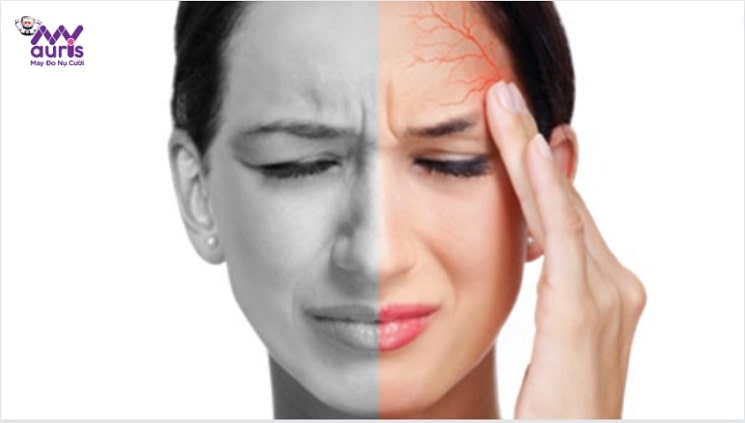Having right-sided migraines can be warning signs that affect your overall health. Therefore, to overcome this situation, read the article below to learn the causes and remedies to control right-sided migraines.
What are the causes of right-sided migraines?
Migraines are one of the 300 types of headaches that are common symptoms and are of concern to many people. Furthermore, headache symptoms are often accompanied by feelings of fatigue, nausea and visual disturbances.
Besides, there is currently no clear cause for this phenomenon. However, according to experts, the main causes of right-sided migraines are:
Nerve-related problems
Different problems in the brain can cause you to have headaches on one side. The following typical neurological conditions can be the cause of right-sided migraine:
- Occipital neuralgia: This happens when the nerves running from the spinal cord to the head become damaged or inflamed. Furthermore, right-sided migraine symptoms include pain in the back of the head and neck, pain behind the orbit, and sensitivity to light.
- Temporal arteritis: Inflammation of the arteries in the head and neck causes muscle pain along with severe pain on one side. Often accompanied by symptoms such as fatigue, jaw pain and pain in the temples.
- Trigeminal neuralgia: The patient will feel severe pain in the face and face, The pain usually appears on one side at a time. The cause is a disruption of the trigeminal nerve located at the base of the brain.

Medication use
Right side migraines can occur due to side effects of medications including prescription and non-prescription medications. In addition, abusing OTC drugs (Over the counter – Non-prescription drugs) will cause you to have headaches such as Paracetamol, Aspirin, Ibuprofen, etc.
However, this condition can be recovered. According to the World Health Organization (WHO), this headache condition is often called secondary common. DaintyIn addition, headaches caused by overuse of drugs will make you feel bad after waking up.
Injury
People with head injuries can also cause pain in the whole head or the right side of the head. When the injury is too strong, it will affect the brain.
Due to Hormone changes
Hormonal changes during pregnancy or menstrual cycle, estrogen decline, etc. are also the causes of right-sided migraines.
The occurrence of pain due to pathology
People with diseases such as migraine, cerebral anemia, brain tumors, etc. or people with signs of stroke can also feel migraine pain on the right side. Furthermore, the pain can be dull or occur suddenly, causing the patient to feel sharp and uncomfortable.

Types of headaches that affect the right hemisphere of the brain
Migraines
Genetic factors are one of the complications associated with migraines – which are a type of severe headache that causes pain. Usually the feeling of pain will be accompanied by the following symptoms:
- Blurred vision
- Feeling nauseous, vomiting
- Light sensitive
- Sensitivity to sound
Furthermore, ⅓ of people with migraines experience visual disturbances or temporary vision loss. Besides, factors that can trigger migraine symptoms include: bright lights, temperature changes, stress due to stress, skipping meals, sleeping too much or too little,…
Esophageal headaches
This is a rare type of pain but quite serious and often occurs in waves. each cycle. The pain is usually severe and localized on one side of the face. The patient will have to experience pain for several weeks or months before showing signs of improvement:
- Facial sweating;
- Pale skin hor red, respectively
- Red or watery eyes
- Feeling restless
- Swelling around the painful eye
Men are more likely to get headaches than women. The exact cause is still unknown, but smoking, drinking alcohol and having a family history of the disease increase the risk of cluster headaches.
Tension headaches
This is a common type of headache that accounts for about 75% of patients. Symptoms of tension headaches include a dull ache and feeling of pressure in the forehead, sides of the head or back of the head. These symptoms usually last for a few minutes and range from mild to moderate.
Chronic headaches
Chronic headaches are headaches that last for 15 days or more in a month. These can also be tension headaches or chronic headaches. At this time, you need to arrange a time to see a doctor for treatment.
Dangerous complications of right-sided migraine
In cases where migraine is untreated or has been treated but develops into complications that affect life such as:
- Recurrent migraine: Migraine can recur frequently and lead to many attacks and difficulty in daily activities;
- Difficulty studying and working: Migraines can reduce the ability to concentrate. This causes difficulties in the process of working and studying.
- Increased risk of stroke: Some high-intensity migraines, such as Migraine with strong pain, can increase the risk of stroke;
- Insomnia: Migraines can cause sleep disorders, leading to insomnia or insufficient sleep, making the body tired;
- Impact on psychological health: Prolonged pain can affect psychological health, causing stress and depression.
- Increased use of medication: Some people rely on medication for pain relief, which can cause unwanted side effects.

When should you see a doctor to avoid dangerous complications? dangerous
Many cases of right-sided migraine will go away on their own without the help of any method. In cases of frequent headaches or frequent right-sided migraines, it is necessary to schedule an examination so that the doctor can determine the underlying cause. From there, effective treatment is available. Furthermore, if you develop the following symptoms, go to the nearest medical facility for treatment as soon as possible:
- Affected or confused vision
- Fever
- Head injury and pain when moving;
- Stiff neck, numbness
- Changes in personality, or perception,
- Rash
- Sleep disorders
- Stuttering
- Prolonged fatigue and weak health
Above is useful information about the condition of right-sided migraine. From there, it will help you understand the cause of headache symptoms. Besides, you need to have regular health check-ups to protect your long-term health.
Kim Dung





